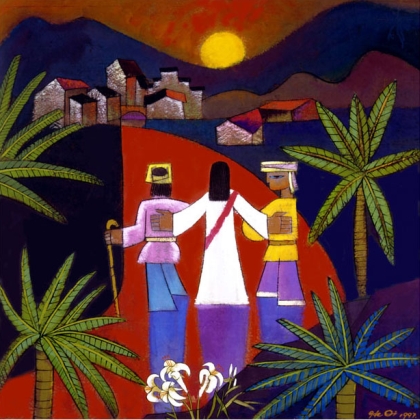 Awit16: 1-2, 5, 7-11
Awit16: 1-2, 5, 7-11
Mga Gawa 2:14, 22-28
1 Pedro 1:17-21
Lukas 24:13-35
Pagkatapos ng mapagbunying pagdiriwang ng buong kristiyanong komunidad sa pasko ng muling pagkabuhay ni Kristo, nanatili ang mapanghamong mensahe nito. Ang diwa ng muli Niyang pagkabuhay ay nangangahulugan ng patuloy na paglalakbay, pagkilos at pakikibaka tungo sa pagsasakatuparan sa buhay na ganap at kasiya-siya para sa lahat.
Sa maraming mga pagkakataon, tayo ay natali lamang sa pag-alala sa buhay, pasakit, kamatayan at muli Niyang pagkabuhay ngunit palagi nating nakaligtaan ang napakamahalagang hamon sa atin sa kabila ng lahat ng ito. Hinding-hindi ko makakalimutan ang tatlong mga salita na binanggit ni Rev. Revelation Velunta hinggil sa buhay at ministeryo ni Kristo. Sabi nya, “itong tatlo ay nananatili: Pagkilos (Movement), Execution (Pagpatay/Pagkitil ng Buhay), at Continuation (Pagpapatuloy). Ngunit ang pinakamahalaga nitong tatlo ay ang Pagpapatuloy.” Ito ay isang pagpapatunay na wala ng anumang bonggang pagidiriwang ang hihigit pa at papalit sa ating pagtangan at pagpapatuloy sa mga adhikain na nasimulan ni Kristo kahit buhay man ang ialay kung kinakailangan.
Ang ebanghelyo ni Lukas ay nagpapahayag sa masalimoot na karanasan ng mga tagasunod kay Jesus sa mga panahong iyon. Nagiging saksi sila sa kasiyahan, kaguluhan, karahasan at kamatayan. Ngunit ang nakakalito sa mga alagad lalong-lalo na sa dalawa na nabanggit sa texto ay ang posibilidad ng muling pagkabuhay ng kanilang kinikilalang lider martir. Kaya sa kanilang paglalakbay patungong Emaus na may labing-isang kilometro ang layo mula sa Jerusalem, ito ang nilalaman ng kanilang pag-uusap. Ngunit habang silay nag-uusap, lumapit at nakisabay sa kanila si Jesus na hindi nila nakilala. Ibinahagi ng mga alagad ang kanilang mataas na pagkilala kay Jesus na magpapalaya sa kanila sa Israel. Sa kabila ng kalungkutan at pagkakalito, ay binigyan nila ng pansin si Jesus. Niyaya nila Siya na sasama sa kanila na maghapunan at doon nila napatunayan na Siya nga si Jesus ng dumampot Siya ng tinapay at nagpapasalamat pagkatapos pinagpira-piraso iyon at ibinigay sa kanila. Noon nila nakilala si Jesus ngunit Siya ay biglang nawala.
Mga kapatid, ang sama-samang paglalakbay at pagbabahagian ng kung anong meron sila sa pagkakataong iyon kasama si Jesus, kahit siya man ay biglang nawala, ay nag-iiwan sa kanila ng alab ng puso na ibahagi ang kanilang karanasan pabalik sa Jerusalem. Sa ganoon ding diwa tayo na mga nananampalataya sa buhay na Kristo na patuloy na kumikilos sa iba’t-ibang yugto ng kasaysayan ay hinahamon na panghawakan at tanganan ang ibayong alab ng puso na handang magpapatuloy sa mga nasimulang gawain ni Jesus. Ito ang natatanging tunguhin sa kanyang pagsasakatawang tao, isinilang sa mga magulang na nagmula sa batayang sektor ng lipunan na kanilang kinabibilangan at naglingkod sa mga aba at isinasantabi ng mga nasa pamunuan sa panahong iyon. Siya rin ay masugid na nagsusulong sa mga katuruan na tunay na nagpapahalaga sa payak at makatarungang pamumuhay, nanggagamot, nagpapakain sa mga nagugutom, kumakalinga sa mga hindi pinapahalagahan, humahamon sa mga ipokrito at mga mapagsamantalang pamunuan. Nagiging banta sa namumuno ng imperyo, sinampahan ng mga gawa-gawang kasi, sinakit, hinatulan ng kamatayan, pinatay ngunit nabuhayng muli.
Gaya kay Kristo, marami na ring mga nag-alay ng kanilang mga buhay sa gitna ng matapat na pagpapatuloy sa nasimulang adhikain ni Jesus. Ito rin ang patuloy na hamon sa bawat isa sa atin, ang handang makipaglakbay kasama ang mga aba at maralita ng kasalukuyang lipunan na ating ginagalawan, patuloy na kikilos at makibaka upang maisulong ang batayang karapatan ng mga mamamayang inaalipin at pinagsamantalahan ng kasalukuyang imperyo at mga makapangyarihan sa sarili nating bayan.
Handa ba tayong sundan ang mga yapak ni Kristo? Mula sa ating mga relatibong komportableng mga tahanan, simbahan at institusyon na pinaglilingkuran, patuloy ang panawagan sa buhay na Kristo na tayo ay tutungo sa iba’ t ibang Emaus ng ating lipunan-mga bulnerableng komunidad upang kasama nila sa kanilang paglalakbay, pagkilos at pakikibaka upang sama-sama nating makamit ang makatarungang kapayapaan na kung saan ang kaganapan ng buhay ay mararanasan na ng nakakarami at hindi lamang sa iilan. Sulong at padayon hanggang sa tagumpay!##
Rev. Irma M. Balaba
NCCP-CUER (Asst. Program Secretary)
UCCP-Faith Bible Church (Administrative Pastor)
Larawang kinuha mula sa https://0lem.wordpress.com/2012/04/10/emmaus-road/


 April 23, 2017
April 23, 2017 Psalm 118:1-2, 16-17, 22-23
Psalm 118:1-2, 16-17, 22-23 Psalm 22:8-9, 17-20, 23-24
Psalm 22:8-9, 17-20, 23-24 “Opo, Panginoon! Sumasampalataya po ako sa inyo at naniniwalang kayo nga ang Cristo, ang Anak ng Diyos na paparito sa daigdig.” (Juan 11:27 BMBB)
“Opo, Panginoon! Sumasampalataya po ako sa inyo at naniniwalang kayo nga ang Cristo, ang Anak ng Diyos na paparito sa daigdig.” (Juan 11:27 BMBB)